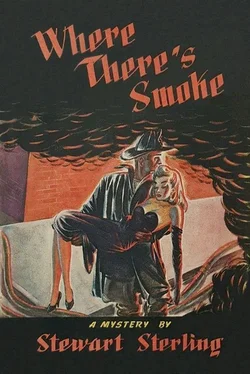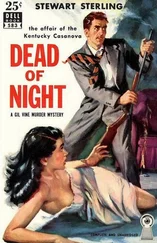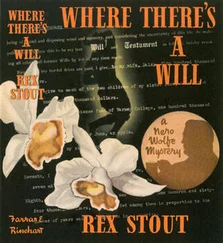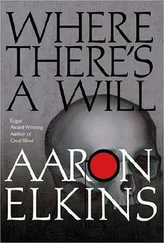“I don’t mind signing a waiver!” the publicity man shouted. “Why should I mind? I’m not guilty of anything!”
Amery gestured irritably. “If you don’t mind, Terry, let me do the talking. I can’t allow a client of mine to be bulldozed into testifying.”
Pedley sat on the lawyer’s desk. “I might make a deal.”
“Willingness to deal—” the attorney was wary — “implies my client has something to lose by not making it.”
“Sure he has something to lose. Time. His freedom. I can take him downtown and lock him up. But I’ll settle for the Grand Jury appearance on your recognizance — if he’ll tell me what strings he pulled to get the Headquarters Squad interested in Lownes’s demise.”
He thought it unnecessary to mention that just before he’d gone to the Olympiad, Barney had relayed him the Fire Commissioner’s urgent insistence on a conference immediately after lunch on the subject of the B.F.I. report. The party who’d brought influence to bear on the police would be the same one who’d convinced the commissioner it would be politic to pull the marshal off the Lownes case.
Amery began to make arrangements of paper clips on his blotter. “That’s an offer I’d accept, Terry. The marshal can get that information sooner or later from other sources, anyway. Your going to higher authority isn’t incriminating — on the contrary. You’ll have to go before the blue ribbon panel in any event, but it’ll be simpler if you don’t have to do it under duress.”
Ross sneered. “I told you I’d bring influence to bear, Marshal. All I had to do was tip off Gaydel that you were set on ruining his star’s rep; he turned his client, his agency and the International Broadcasting bigwigs loose on the mayor.”
Pedley considered. “So that was the ticket! The power of the loudspeaker. The boys at City Hall need plenty of free time on the air in the next campaign. And a few generous contributions wouldn’t come in amiss. Well, it hasn’t worked. Yet. But it might.”
Amery flipped a hand in annoyance. “Let’s not get off at cross-purposes. It appears Terry overstepped himself out of zealousness to protect Miss Lownes’s interest. We’ll grant that was a mistake. But you’d be making an equal error, Marshal, if you fail to appreciate that Ross and Miss Lownes and I are quite as anxious as you are to put this firebug behind bars.” The lawyer pushed the paper clips together in a heap. “We’ll do whatever we can to help you convict this incendiarist. I don’t know what headway you’ve made, but—”
He stopped. The secretary in the outer office was screaming!
Pedley took three strides; yanked at the doorknob. Miss Bernard was on her knees by the files. She was bending over one of the lower drawers, as if to hide. Her eyes were riveted on the door into the corridor. Pedley followed her glance.
The door was open a little. Through the foot-wide aperture there was a glint of blue metal. Pedley’s reflexes worked at top speed. He ducked, dragged his own gun from the holster, switched off the lights in the inner office in three smoothly co-ordinated movements.
With the click of the switch came the shot. The orange pencil of flame pointed at the door of the private office. Before the glass had stopped tinkling, Pedley stuck his own arm out, blasted at the segment of dark corridor twenty feet away.
The secretary squealed, “E-e-e-e-e-ee!” Ross cursed hoarsely, flattened himself against the wall.
The marshal crossed the outer office, kicked open the door. The corridor was empty, except for Amery, peering nervously around the jamb of the door leading from his private office into the hall. Then a couple of doors opened down toward the elevator; girls peered out cautiously.
“Ran down—” The lawyer pointed to the stair well.
“Who was it?” Pedley had no intention of conducting a man hunt through the 28 floors of the Tower Building.
“I couldn’t see him clearly.” The lawyer was shaking; he clung to the door for support.
“Staro?”
“No.” Amery looked hard at Terry Ross, who came timidly out into the corridor. “Staro’s not that tall. He’s not tanned like this — gunman.”
Ross babbled, “He tried to kill you, Paul!”
“He wasn’t shooting blanks, that’s sure.” Pedley went back into the office, snatched the phone.
“Police — Emergency.” While he waited for the connection, he asked, “What’ll I give ’em for a description?”
Amery spoke reluctantly. “I was going to say he was about the size and build of Bill Conover — but that would be ridiculous. I know it wasn’t Conover.”
Chapter Nineteen
In a Turkish Bath
The bullet had gone through a picture of “The Buckaroos,” perforating a ten-gallon hat and drilling a half-inch hole in the paneled oak.
“Forty-five,” Pedley said. It was the kind of gun an ex-officer would be expected to possess, all right. “Didn’t you get a peek at him, Miss Bernard?”
“No.” She was breathless. “I heard the door open and looked up and there was this arm sticking in from the hall with the biggest pistol I ever saw. The man didn’t come in and he didn’t say anything and of course I couldn’t so much as speak. Then I guess I did scream and you came in—” She sat down, her knees weak.
Amery dabbed with his handkerchief at beads of perspiration on his forehead. “I’ll have to ask for police protection until he’s caught.”
“There’s been an alarm out for Conover since early this morning.” Pedley stood in the corridor door to reassure the secretary. “If it was the lieutenant, he hasn’t had time to get out of the building. They’ll get him.” He had a few reservations about it, but he kept them to himself.
When the radio patrol came up on the elevator, the marshal told them he’d seen a hand and a gun, nothing more. He couldn’t identify the hand but if they located the gun they could check it against the bullet in the panel over Paul Amery’s desk.
The lawyer wanted to call Leila. But the sergeant from the patrol car vetoed that in favor of a personal call by the uniformed force to see if Conover had headed toward the apartment.
Pedley didn’t offer an opinion on that, either. The one point on which he expressed himself forcibly was Staro.
“If it wasn’t Staro who did this gunwork — and the light’s so bad in the hall that I wouldn’t rule him out — in any case, you’re not going to see him here in your office, Amery.”
“Of course not,” the lawyer agreed. “If he came into the building now and saw a cordon of officers down in the lobby, he certainly wouldn’t try to come up to the office. I don’t know a great deal about his background but I’m sure he’s had some uncomfortable moments in the company of policemen.”
“Doesn’t anybody know where this Staro hangs out?”
Ross said, “He did live with Ned. Slept on the divan in the living-room.”
“What’s he look like?”
“He’s Italian. But doesn’t look like one, exactly.” The press agent held out his hands to indicate. “Heavy-built. About my height. Black hair — can’t remember what color his eyes are — guess you’d call his complexion florid. Wears flashy suits and neon neckties.”
“And the Little Boy Blues haven’t been able to pick up a traveling trademark like that!” Pedley went to Amery’s desk, wrote WOrth 2-4100 on the pad. “Phone me or leave a message at this number when you get in touch with the guy, hah?”
Amery said the next time he got in touch with anybody, it would be when he had a plain-clothes man at his elbow.
“That’s smart.” The marshal was emphatic. “If the ballyhoo boy here has any sense—” he turned to Ross — “he’ll ask headquarters for a plain-clothes pal for the next couple of days, too. This firebug plays for keeps — and I don’t think he’s played out his string yet.”
Читать дальше











